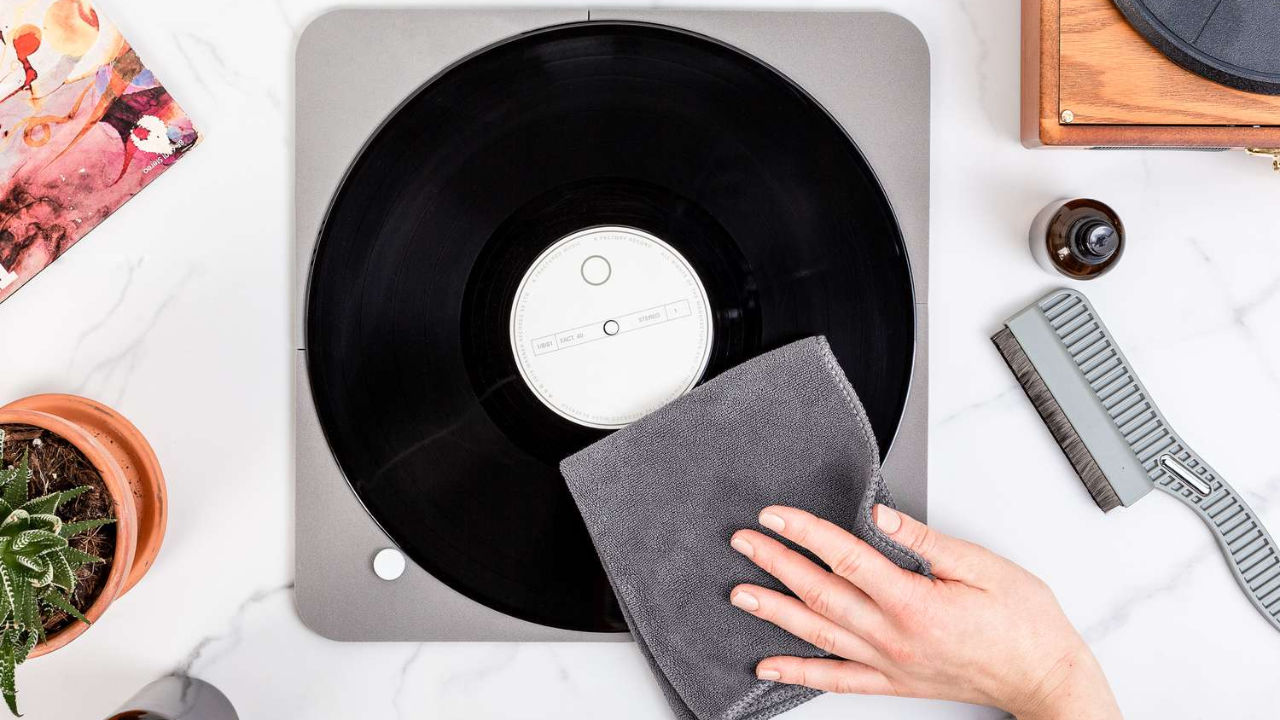Vinyl records are magical, aren’t they? There’s something so satisfying about dropping the needle and hearing that warm, crackling sound. But let’s face it—keeping them clean is a whole other story. Did you know that even tiny specks of dust can mess with your sound quality? I learned that the hard way when my favorite Fleetwood Mac album started skipping during “Landslide.” Spoiler alert: I hadn’t cleaned it in months! In this guide, I’ll share everything I’ve learned (the easy way and the hard way) about how often you should clean your vinyl records to keep them sounding amazing.
Contents
Why Cleaning Vinyl Records Regularly Matters?
When I first started collecting vinyl, I had no clue how important cleaning was. I mean, these records had survived decades—how bad could a little dust be, right? Wrong. Dust, dirt, and even fingerprints can wreak havoc on your music. That crackling sound that’s kinda charming at first? Yeah, it’s not so cute when it drowns out your favorite guitar solo.
Dust doesn’t just mess with the sound, either. It can actually scratch the grooves if left untreated. And those scratches? Permanent. Plus, all that grime can wear out your stylus faster than you’d think. Trust me, replacing a stylus isn’t cheap. Keeping your records clean is like giving your music collection a long, happy life. So, do your albums a favor and show them some love.
Factors That Determine Cleaning Frequency
Okay, so how often should you clean your records? It depends. If you’re like me and play some albums on repeat (looking at you, “Rumours”), you’ll need to clean them more often. Here are a few things to consider:
- How often you play them: Frequent plays mean more exposure to dust and oils from your hands. If you’ve got a favorite, it’ll need extra TLC.
- Storage conditions: Are your records sitting out in the open or tucked safely in a cabinet? Dust accumulates fast if they’re not stored properly.
- Inner sleeves: Anti-static sleeves are a game changer. I didn’t believe it until I switched, and wow, the difference is huge.
- Secondhand purchases: Pre-loved records often come with a bit of “history”—and by that, I mean grime. A good deep clean is non-negotiable.
If you’re unsure, err on the side of caution. A light clean after every play and a deep clean every 10-15 spins is a good rule of thumb. Oh, and always check for visible dust or smudges before you hit play.
Recommended Cleaning Schedule for Vinyl Records
Here’s the deal: you don’t have to scrub your records daily, but consistency is key. After every play, I give mine a quick once-over with an anti-static brush. It’s fast, easy, and keeps dust from building up. Every couple of weeks, I’ll do a deeper clean for the ones I play often. If a record hasn’t seen the turntable in a while, I’ll clean it before playing—just in case.
For rare or valuable records, I’m extra careful. These get a full deep clean every time I’m about to play them. It might sound obsessive, but when you’re working with vintage vinyl, it’s better to be safe than sorry. And hey, isn’t it kind of satisfying to see your collection looking spotless?
Tools and Techniques for Cleaning Vinyl Records
Let’s talk tools. Back when I started, I used a microfiber cloth and some DIY cleaner. Rookie mistake. Now, I’ve got a proper setup, and it’s made all the difference:
- Anti-static brushes: These are your daily go-to. A quick swipe before and after playing keeps dust in check.
- Record cleaning sprays: Perfect for light cleaning. Just spray and wipe gently.
- Record washers: For deep cleans, nothing beats a proper washer. I splurged on one a couple of years ago, and it’s worth every penny.
- Ultrasonic cleaners: If you’ve got a big collection or some rare gems, this is the gold standard. It’s like a spa day for your records.
Whatever you use, be gentle. Vinyl is tough, but it’s not indestructible. Avoid household cleaners at all costs—those can strip away the protective coating and leave your records worse off than before.
Signs Your Vinyl Record Needs Immediate Cleaning
How do you know it’s time for a deep clean? Look and listen. If you see visible dust or smudges, grab your cleaning kit. Hearing pops, skips, or static? That’s another red flag. Sometimes, you’ll notice static buildup when you’re handling a record—it’ll feel like it’s sticking to your hand. When that happens, it’s time to break out the anti-static tools.
One time, I ignored the signs and kept playing a dusty record. Big mistake. Not only did it sound awful, but it also left gunk on my stylus. Lesson learned: when in doubt, clean it out.
Common Cleaning Mistakes to Avoid
Cleaning records seems simple enough, but it’s easy to mess up. Here are a few rookie mistakes I’ve made (and how you can avoid them):
- Using household cleaners: I tried Windex once. Never again. Stick to products made for vinyl.
- Too much pressure: I thought scrubbing harder would get rid of stubborn spots. Spoiler: it doesn’t. Be gentle.
- Neglecting the stylus: Your records aren’t the only thing that needs cleaning. A dirty stylus can ruin playback and even damage your grooves.
Take your time and use the right tools. Cleaning your records should feel like a ritual, not a chore.
Conclusion
Cleaning your vinyl records isn’t just about preserving sound quality—it’s about showing love to your collection. A little effort goes a long way. Start with a light clean after every play and schedule deeper cleans as needed. Trust me, your ears (and your wallet) will thank you. Got any cleaning tips of your own? Drop them in the comments—I’d love to hear how you keep your records spinning strong!
Also read
How to Spot Fake Vinyl Records
Vinyl Collecting Mistakes to Avoid

I am Kenneth Haney, an unyielding audiophile and an ardent collector of vinyl records. My love affair with vinyl started at a young age of 15. As a teenager, I found myself enchanted by the distinct warmth and depth that vinyl brought to music. Unlike digital music, vinyl records carry a tangibility, a piece of history, an art that exists far beyond the confines of an MP3 file.
